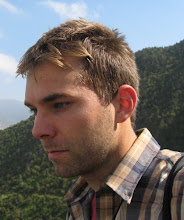I thought I should write a little installment regarding the new language, as it is such a central facet to Peace Corps life. The majority of training revolved around daily language sessions and now, at my site, learning, speaking, and improving my language ability is an everyday thing.
My confidence with the language comes and goes in phases. I'll have a week or two where I feel as though I've absorbed nothing new and have been repeating the same tired phrases endlessly. Sometimes it feels like I've forgotten half of what I've learned. When people (especially new acquaintances or in new situations) speak to me I freeze up and can't think at all. Contrariwise, there are times when I can blather on conversationally with a fair amount of creativity and ease. I find my listening comprehension to be much better than my verbal ability. What used to be strings of weird sounds are now words and phrases with shape and meaning.
I notice myself using the language more freely. By this I mean that in order to speak I don't always have to "map out" my sentences (conjugation is by far the biggest obstacle) before speaking them-- it's slowly becoming automatic. Very slowly, but that's fine. I forget that I've only been at it for several months. Even during the times where my competence seems to recede progress is being made; such times are natural and ultimately necessary and beneficial.
The tricky thing about my town is that one of the Berber dialects, Tashelheit, is spoken prominently. I can get by without having to learn this, as most people speak Darija (Moroccan Arabic) as well. Moroccans seem to be born linguists-- it's amazing. Many people know Darija, a Berber dialect or two, standard Arabic, and French from a young age.
I'm learning Arabic script as well, though this doesn't get top priority. It's coming along much more quickly than I expected and I can practice casually, reading passing signs or whatever's around-- just learning to match the symbols with their sounds. Of course, just because I can read something doesn't mean I can understand it; I still have to be able to translate it from Arabic.

I meet with my tutor once a week. I've kept a "language journal" in which I just write out the events of a particular day, tell a story, or whatever. I compile a list of questions I've been meaning to ask regarding vocabulary, grammar, etc. We go through the entries and make corrections. Last time we met, however, instead of this we just practiced conversation, something I found to be much more beneficial than using the journal. Both have their advantages, but improving listening comprehension and verbal ability is more practical at the moment.
Occasionally people in Town want to practice their English with me, and I my Arabic with them. So on goes our conversation in two languages, each of us speaking the others'. Cultural exchange? I hope so.


1 comment:
You'll know your over the hump, so to speak, when you start dreaming in Darija. The good news is, after two years of language immersion, you'll ALWAYS have potential employment, in any of a dozen fields. If you start dreaming about slaughtering goats for the holidays, well, then I'll start worrying about you.
Post a Comment